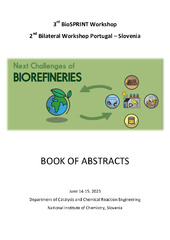Prikaz osnovnih podataka o dokumentu
Bio-based unsaturated polyester resins – a step towards a biorefinery solution
| dc.creator | Pantić, Olga | |
| dc.creator | Savić, Sanja | |
| dc.creator | Panić, Vesna | |
| dc.creator | Marković, Maja | |
| dc.creator | Spasojević, Pavle | |
| dc.date.accessioned | 2023-11-21T17:50:54Z | |
| dc.date.available | 2023-11-21T17:50:54Z | |
| dc.date.issued | 2023 | |
| dc.identifier.isbn | 978-961-6104-86-9 | |
| dc.identifier.uri | http://TechnoRep.tmf.bg.ac.rs/handle/123456789/6860 | |
| dc.description.abstract | The importance of producing thermoset polymers from natural resources has grown due to environmental concerns. Implementing the biorefinery concept is vital for replacing petroleum-based raw materials and transferring to cleaner technologies. Unsaturated polyester resins (UPRs) are a significant class of thermosetting polymers, with a wide range of properties gained from a considerable number of materials that are used for their synthesis. They can be used as pure resins or resins reinforced with suitable fillers in composite material production, which is the focus of this research. Generally, UPRs consist of two main components, prepolymer and reactive diluents, commercially both of which are commonly derived from petroleum. So, it is important to find an adequate bio-based alternative not only for styrene as a reactive diluent, but also for monomers that are used for prepolymer synthesis. Many bio-based monomers (propylene glycol, isosorbide, neopentyl glycol) and reactive diluents (vinyl levulinate, butanediol dimethacrylate, dimethyl itaconate) were investigated in formulating a bio-based UPR. Alongside this, many different bio-based fillers (hemp fibres, spent coffee grounds, rosehip seed flour) were also examined, to conclusively obtain a fully bio-based composite material. Sole introduction of bio-based raw materials is insufficient for proper implementation of the biorefinery principle. It is equally important that the final formulation of the obtained composite material demonstrates that it is environmentally and economically feasible. The quality and market price of the bio-based composite material must be at least be comparable to or better than those of a product from a conventional process in order to be competitive. | sr |
| dc.language.iso | en | sr |
| dc.publisher | Ljubljana : National Institute of Chemistry, Department of Catalysis and Chemical Reaction Engineering | sr |
| dc.rights | openAccess | sr |
| dc.rights.uri | https://creativecommons.org/licenses/by/4.0/ | |
| dc.source | Book of Abstracts / Next Challenges of Biorefineries, 3rd BioSPRINT Workshop 2nd Bilateral Workshop Portugal, Slovenia, June 14-15, 2023 | sr |
| dc.title | Bio-based unsaturated polyester resins – a step towards a biorefinery solution | sr |
| dc.type | conferenceObject | sr |
| dc.rights.license | BY | sr |
| dc.citation.spage | 14 | |
| dc.identifier.fulltext | http://TechnoRep.tmf.bg.ac.rs/bitstream/id/18693/bitstream_18693.pdf | |
| dc.identifier.rcub | https://hdl.handle.net/21.15107/rcub_technorep_6860 | |
| dc.type.version | publishedVersion | sr |

